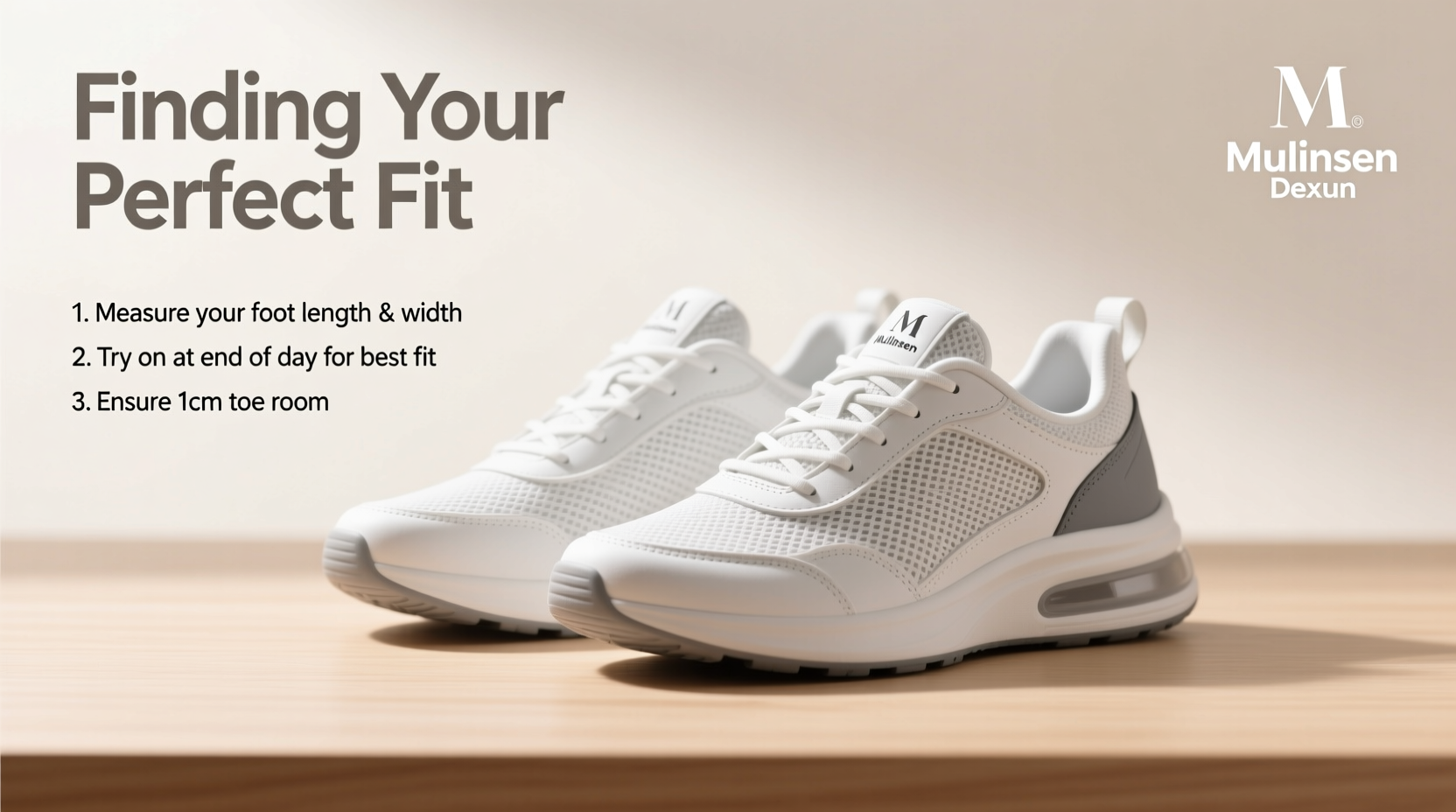Finding the right pair of sneakers can transform your daily comfort, posture, and confidence. For many women, Mulinsen Dexun sneakers have become a go-to choice due to their minimalist design, lightweight construction, and versatility across casual and active settings. However, even the most stylish sneaker falls short if it doesn’t fit properly. Ill-fitting shoes lead to blisters, foot fatigue, and long-term discomfort. This guide dives into the specifics of achieving the ideal fit with Mulinsen Dexun women’s sneakers—covering sizing nuances, in-store versus online buying strategies, foot anatomy considerations, and real-world testing methods.
Understanding Mulinsen Dexun Sizing Patterns

Mulinsen Dexun uses a standard Asian sizing chart, which often runs slightly smaller than U.S. or European equivalents. Many customers report that ordering one full size up from their usual U.S. size provides a more accurate fit. Width is another critical factor: these sneakers typically feature a narrow to medium toe box, making them less suitable for wide feet unless specific models are labeled as “wide” or “comfort-fit.”
The brand does not currently offer half sizes, which can complicate selection for those between whole numbers. In such cases, opting for the larger size and adjusting with insoles or heel grips is often recommended.
Step-by-Step Guide to Measuring Your Feet at Home
Since foot size can change over time due to age, weight fluctuations, or pregnancy, measuring your feet before every major footwear purchase ensures accuracy. Follow this simple process:
- Place a blank sheet of paper on a hard floor, against a wall.
- Stand on the paper barefoot in the late afternoon (feet expand during the day).
- Have someone trace the outline of both feet using a pencil held vertically.
- Measure the longest distance from heel to toe in centimeters or inches.
- Compare this measurement to the Mulinsen Dexun size chart.
- Repeat for the other foot—always size to the larger foot.
Many buyers overlook asymmetry, but differences of up to half a size between feet are common. Choosing a size based solely on your smaller foot increases the risk of pressure points and friction.
Choosing Between Online and In-Store Purchases
While online shopping offers convenience, it removes the ability to physically try on the shoe. Mulinsen Dexun has limited physical retail presence, meaning most purchases happen through third-party platforms like Amazon, AliExpress, or the brand’s official web store. To compensate for lack of in-person fitting, consider these tactics:
- Read verified customer reviews focusing on fit comments (“runs small,” “tight arch,” etc.).
- Check return policies—ensure you can exchange within 30 days.
- Purchase from sellers offering free returns to reduce risk.
- Use virtual fit tools if available (e.g., Amazon’s Fit Assistant).
If possible, visit a local shoe store that carries similar styles (such as minimalist canvas or low-top sneakers) to test comparable fits before ordering online.
Fit Checklist Before Finalizing Your Purchase
Before clicking “buy,” run through this essential checklist to avoid disappointment:
- ✅ I’ve measured both feet recently and know my current length and width.
- ✅ I’ve consulted the official Mulinsen Dexun size chart, not a general conversion tool.
- ✅ I’ve read at least five recent customer reviews about fit and comfort.
- ✅ I’ve confirmed the return policy allows exchanges if the size is off.
- ✅ I’m ordering in the afternoon or evening when feet are slightly swollen.
- ✅ I’ve considered using orthotics—if so, I’ll account for reduced internal space.
Real-World Testing: Breaking In Your Mulinsen Dexun Sneakers
Even with careful measurement, subtle fit issues may only emerge after wearing. A proper break-in period helps assess true comfort without risking injury. Here’s how to evaluate fit over the first week:
| Day Range | Activity | What to Monitor |
|---|---|---|
| Day 1 | Wear at home with socks | Heel slippage, tightness across toes |
| Day 2–3 | Short walks (15–20 minutes) | Blisters, arch support adequacy |
| Day 4–5 | Errands or light standing | Ball-of-foot pressure, breathability |
| Day 6–7 | Extended use (1+ hours) | Overall fatigue, toe wiggle room |
If discomfort persists beyond day three—especially sharp pain or recurring hot spots—do not continue wearing. Early intervention prevents lasting damage to skin and joints.
“Proper fit isn’t just about length—it’s heel stability, forefoot volume, and flexibility alignment with your gait.” — Dr. Lena Torres, Podiatrist & Footwear Consultant
Common Fit Issues and How to Fix Them
Even well-measured purchases can present minor fit challenges. Below are frequent concerns and practical solutions:
- Heel Slippage: Use a thin heel grip or ankle sock. If excessive, consider going down half a size—but only if toe room allows.
- Tight Across the Top of the Foot: Loosen laces or use elastic shoelaces. Avoid forcing feet into constricted areas.
- Toes Touching the End: There should be 3–5 mm of space. If touching, size up immediately.
- Inadequate Arch Support: Insert a removable orthotic insole designed for low-profile sneakers.
Never rely on “they’ll stretch out” as a justification for buying tight shoes. While fabric components may relax slightly, structured parts like midsoles and heel counters do not adapt significantly.
Mini Case Study: Sarah’s Search for All-Day Comfort
Sarah, a 34-year-old teacher from Portland, ordered her first pair of Mulinsen Dexun sneakers online after seeing them featured on a lifestyle blog. She normally wears a U.S. 7.5 and assumed a size 38 (listed as equivalent) would suffice. Upon arrival, she found the left shoe pinched her second toe, causing redness after just 30 minutes of wear.
She rechecked the brand’s size chart and realized that their 38 corresponds to a U.S. 7, not 7.5. She exchanged for a 39 (U.S. 8), added a slim memory foam insole, and began the seven-day wear test. By day five, she was walking confidently through school corridors without discomfort. Her experience underscores the importance of precise sizing and cautious real-world evaluation.
Frequently Asked Questions
Do Mulinsen Dexun sneakers run small?
Yes, most customers find they run slightly small compared to U.S. standards. It’s generally advisable to size up by half to one full size, especially if you have wider feet or plan to wear thicker socks.
Can I wear orthotics with these sneakers?
Most Mulinsen Dexun models have removable insoles, allowing space for custom orthotics. However, due to their slim profile, opt for low-profile inserts no thicker than 3 mm to prevent crowding.
How do I know if the toe box is too narrow?
If your toes feel compressed, numb, or slide sideways when walking, the toe box is likely too narrow. You should be able to wiggle all toes freely. Persistent pressure may lead to bunions or neuromas over time.
Final Thoughts: Prioritize Fit Over Fashion
A perfectly fitted sneaker supports your body’s natural mechanics, reduces strain, and enhances mobility. With Mulinsen Dexun’s growing popularity, it’s tempting to order based on aesthetics alone. But lasting satisfaction comes from thoughtful measurement, informed sizing decisions, and patient real-world testing. Whether you're walking to work, traveling, or simply running errands, your feet deserve footwear that truly fits.









 浙公网安备
33010002000092号
浙公网安备
33010002000092号 浙B2-20120091-4
浙B2-20120091-4
Comments
No comments yet. Why don't you start the discussion?